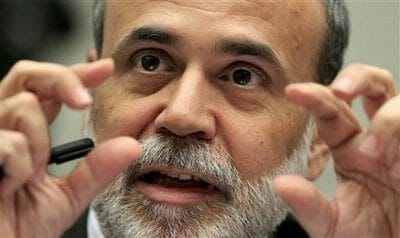|
Listen To The Article
|
 [1]WASHINGTON — The United States cannot fully recover from the worst recession in decades until “we use new metaphors about the economy,” Federal Reserve Chairman Ben Bernanke said Thursday.
[1]WASHINGTON — The United States cannot fully recover from the worst recession in decades until “we use new metaphors about the economy,” Federal Reserve Chairman Ben Bernanke said Thursday.
Bernanke explained “we have long said things like ‘the U.S. economy is picking up speed on the road to recovery, though there are bumps on the way,’ but this sort of automobile metaphor assumes that an economy is a thing that needs gasoline, radial tires, and windshield wiper fluid.” He also explained that consumers and manufacturers spend too much time debating whether the auto in the metaphor is a Dodge Dakota truck with a PowerTech V8 or a Toyota Celica Camry with intermittent wipers.
In prepared remarks to the National Press Club in Washington, D.C., Bernanke warned that the old metaphors “are not strong enough to drive down high unemployment, and it could take several years for new metaphors to take effect.”
Bernanke argued more emphatically against using metaphors that assume the economy is a single organism that grows and wanes in strength, “as if the economy were a gorilla with a sickness.” He insisted that we not speak of our gorilla being “fed” and “rebounding” and “showing solid growth in the last three months of the year.” Gorillas, he said, “especially those plagued with illness, lack the finesse needed. They are overly hairy and have questionable feet.” Bernanke explained that consumers know that gorillas can grasp small objects with their very overly flexible feet, and they map this onto the economy with devastating consequences. “That is, consumers, not gorillas,” he clarified.
Joint Economic Committee member, Jeff Warner (R-Kansas) said, “I don’t know what a metaphor is, but it’s clear that no monkeys of any sort should be driving our Toyotas.” He said he supported Bernanke’s call to draft a bill specifying a new set of metaphors for national and international use.
Bernanke presented a short list of proposed new metaphors for the economy. “We have to overcome the ancient fetish that ‘up’ is good and ‘down’ is bad and that ‘growth’ is superior to chaos.” He pointed to gravity as a natural feature of the cosmos in which objects descend toward the earth with very positive connotations. “When an apple falls to the earth, we don’t worry that it will ruin the tree’s spending habits.”
Bernanke recommended using more of the metaphors associated with entropy and the Second Law of Thermodynamics when thinking about economic issues. “Chaos and disintegration are very normal and good within the world of entropy. When an ice cube melts down in a cup of water, we praise it as a normal and healthy bit of heat transference.” He added, when an economy melts down, we “should talk of it as if it were a giant ice cube, maybe the size of Texas, or Texas and Alaska combined, and imagine that ice cube melting in the south Pacific. It would be a very beautiful process to contemplate.”
Committee Vice Chair, Loretta Burgess (D-Indiana) responded, “I’m not usually a Bernanke fan, but it makes much more sense to tell my constituents that the economy is a glass of cold tea in August. Tea is fun to watch in the summer.”
Rep. Maurice Cummings (R-New York) voiced the loudest opposition to Bernanke’s metaphor proposal. In a press conference following the National Press Club meeting, Cummings said, “It’s just like Bernanke to think that a shift in metaphor will rescue our ailing gorilla. His proposal completely omitted any talk of the power of similes, synecdoches, euphemism, and even alliteration in increasing consumer confidence and the purchasing power of the dollar.” He added that the French economy plummeted by switching only metaphors, but Albania’s grew by imposing a wide range of figures of speech, including much onomatopoeia. Cummings said alliteration ranked first among top figures of speech, whereas metaphor only ranked eleventh.
Following the delivery of his prepared speech, Bernanke took questions from financial journalists gathered at the event — a radical departure for a sitting chairman of the U.S. Federal Reserve. Bernanke said he took the unprecedented step of meeting with journalists because as “needy and sometime useless English majors, you can rise above your more successful friends by helping the economy with injections of new metaphors at every possible opportunity.”
With the economy still unstable and most of the Fed’s ammunition to spur growth already spent, Bernanke clearly wanted to boost the economy by exerting his influence through the media.
“Consumers and manufacturers need to become familiar with the new images behind our economic description, and why we are doing it,” he added, noting that a Fed committee is considering the establishment of a regular Fed press conference and will issue its recommendations in poetic form. Bernanke closed the question session by explaining the forthcoming drop in interest rates in the language of Robert Frost’s poem “Mowing,” – “My long scythe whispered and left the hay to make….The sweetest dream that labor knows.”